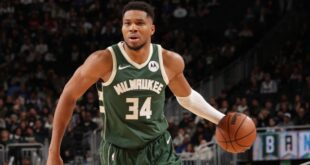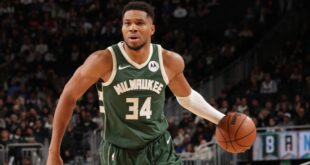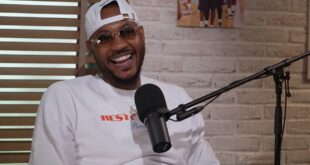**Editor’s Note:** For more detailed coverage of the NBA, check out The Athletic here. The opinions expressed on this page may not align with those of the NBA or its franchises.
***
MINNEAPOLIS— Anthony Edwards is fueled by an unwavering confidence that flows through him, supplying his game with the essential energy needed for growth while expelling any negativity that could hinder his progress. This vitality not only invigorates him but also revitalizes the Minnesota Timberwolves, who are experiencing their most vibrant period in recent memory.
In an environment where confidence is crucial for success, Edwards stands out even more impressively. His demeanor, however, was strikingly different after the Timberwolves suffered a crushing defeat at the hands of Luka Dončić and the Dallas Mavericks during Game 5 of last year’s Western Conference finals on their home turf.
“We’ll be back next year,” Edwards asserted.
Excuse me… could you repeat that? You do realize you’re part of the Timberwolves, right? The franchise that has only reached this stage twice in the last 35 years? The organization notorious for more 60-loss seasons (nine) than playoff wins (only four at that point)? The team with a past so lackluster that fans yearn for the original blue and green jerseys from a time when the franchise was on the verge of being sold just five years after its inception?
Despite a crushing 124-103 loss on May 30, 2024—one that all but ended after Dončić hit his fourth three-pointer with just over two minutes left in the first quarter—Edwards displayed an extraordinary conviction about the future.
He wandered through a stunned locker room, making eye contact with each teammate, and declared what they could expect.
“I told them that they know we’ll be back in this exact position next year,” he stated. “So let’s train knowing we all have to prepare, myself included.”
Now, the Timberwolves have returned. A commanding 121-110 victory over the Golden State Warriors on Wednesday secured their advancement in just five games, marking the first time in franchise history that they’ve reached the Western Conference finals in consecutive seasons. Julius Randle led the team with 29 points, complemented by eight rebounds and five assists, while Rudy Gobert enjoyed his finest game of the series with 17 points and eight rebounds, boasting a team-high plus-21. Mike Conley also contributed significantly, shaking off a slow start to finish with 16 points on 5-of-7 shooting, along with eight assists and six rebounds.
As for Ant? The Warriors aimed to contain his scoring output in Game 5, yet that strategy only highlighted his growth as a player. He recorded 22 points alongside a remarkable 12 assists. Adding to that, he blocked three shots, grabbed seven rebounds, and nailed five three-pointers, sealing the game decisively with a pull-up from 25 feet with less than seven minutes to go.
“He’s the brightest star in the world,” remarked Randle during a TNT interview. “Everywhere he goes, all attention is on him.”
His soaring belief in both himself and his team is almost audacious, pulling one of the historically less successful franchises in professional sports toward a brighter future.
In less than a year, Edwards has made good on his promise, although the journey back has been anything but straightforward. Over the course of 349 days, many events unfolded. Edwards claimed a gold medal with Team USA, and Karl-Anthony Towns was traded before training camp, giving way to Randle and Donte DiVincenzo, the latter of whom faced significant injuries in January. The Timberwolves struggled early, hitting a snag at 8-10 by Thanksgiving, landing at 14-14 on Christmas Eve and staggering to a 22-21 record by late January.
Many questioned Randle’s fit within the team. Tim Connelly, the president of basketball operations, faced criticism for trading KAT after reaching the conference finals (after previously being labeled unwise for acquiring Gobert). Coach Chris Finch was criticized for not replicating the success of last season—a surprising run that had energized the fan base and the community. The optimism from the previous season felt more like a burden than a launching pad to greater achievements.
When asked whether he had doubts about the team reaching its current position, Finch offered a modest smile.
“Depends on which day you asked me,” he responded. “That’s part of the journey. We felt confident in our group as soon as we started playing to our potential.”
Once Randle returned from his groin injury and DiVincenzo came back from a toe injury that sidelined them for much of February, everything fell into place. The Timberwolves concluded the regular season with a remarkable 17-4 record, securing the No. 6 seed and sidestepping the Play-In Tournament. They have dominated recently, going 30-6 over their last 36 outings with Randle on the court. They dispatched the Los Angeles Lakers 4-1 in the first round and swept the Warriors in four consecutive games after dropping the series opener.
With a few days to rest, they now await the winner of the Denver Nuggets vs. Oklahoma City Thunder series.
“Everyone wants to rush the process,” Finch reflected. “People desire everything to improve immediately compared to previous experiences. That becomes irrelevant when you’re starting a new season with a fresh lineup.”
Throughout the season, the public urged Finch for alterations—suggesting he bench the aging Conley, promote Naz Reid for additional spacing, or grant more playtime to the rookies. However, Finch remained steadfast in his decisions, all of which have been validated by their current success. During a training camp meeting, he posed a challenge to the team.
“Were you a Western Conference finals team, or just a team that reached the Western Conference finals?” Finch queried. “The only way to prove that is by doing it again. That was our mission throughout the year.”
Through the peaks and valleys, Edwards maintained his unwavering faith. He serves as the ultimate motivator, and while he’s undeniably talented on the court, his ability to instill confidence in his teammates when they hold the ball could be even more significant. Anyone experiencing a lull in confidence only needs to be near Edwards to absorb his extraordinary energy.
Randle is playing the best basketball of his career, dispelling doubts about his playoff capabilities. Jaden McDaniels is emerging as a formidable two-way player, contributing 14 points, four rebounds, and four steals. DiVincenzo broke free from his early-season slump thanks to a training session with Edwards.
Then there’s Conley, the wise veteran who was affected deeply by the previous season’s loss to the Mavericks. Having played for 18 years without reaching the NBA Finals, after the Wolves’ triumph over Denver in Game 7 of the second round, he firmly believed they possessed a genuine shot at a championship. When faced with the swift decline against Dončić’s threes and Kyrie Irving’s drives, Conley felt crushed. Yet, Edwards reassured him.
“What you learn about him is that he believes every word he says, no matter what it is. At that moment last year, I believed him,” Conley reflected. “I felt we would have another chance together, and that this wasn’t the end of the line.”
Fostering belief in the Timberwolves was once as rare as encountering a 50-degree day in January. They are the franchise that overlooked Steph Curry (twice) during the draft. They are the franchise that Butler couldn’t exit quickly enough. They are the franchise that Green mockingly critiqued at every opportunity.
This is why their victory over the Warriors is so cathartic.
Appropriately, it was a collective effort that culminated in their most impressive performance of a difficult series. The Timberwolves shot an astounding 63 percent from the field, outscoring the Warriors 72-50 in the paint while leading for the majority to become the first Minnesota men’s team in the four major professional sports to advance to the semifinals in consecutive seasons since the old Minnesota North Stars did so in 1980 and 1981.
The fact that the Timberwolves achieved this feat would have seemed nearly impossible just a few years ago, prior to Edwards joining in 2020. Yet fortune appears to be swinging in the Timberwolves’ favor, perhaps for the very first time.
Curry strained his hamstring during the second quarter of Game 1, which turned out to be the Warriors’ sole win of the series. Golden State had a record of 4-1 against the Timberwolves with Curry on the court but was 0-4 without him.
Had Curry been available, the series might have unfolded differently—similar to how the 2004 Western Conference Finals might have played out had the Wolves had a healthy Sam Cassell. Or perhaps the 2015 NBA Finals would have had a different tone had Irving and Kevin Love been active for the Cavaliers against the Warriors.
“They defeated us,” Green graciously acknowledged. “Injuries are part of the game. We’ve claimed titles when key players were sidelined. That is just how it goes.”
What can be noted is that Curry’s absence prevented Edwards from adding another significant victory to his record of slaying giants. He has triumphed over Kevin Durant, Devin Booker, Nikola Jokić, LeBron James, and Dončić in the playoffs over the past two seasons, and he was eager to include Curry in that list. The two formed a bond during the Olympics last summer, with Curry drawn to Edwards’ blend of confidence and spirit that has captivated other All-NBA players like Randle, Towns, and Gobert.
In return, Edwards became fascinated by Curry’s training and game rituals, the meticulousness behind his excellence. The Warriors might find that their downfall stemmed partially from Curry unknowingly guiding Edwards on his path.
Following his experience with Team USA, Edwards dedicated the bulk of his preseason training to enhancing his outside shooting, both in catch-and-shoot situations and off the bounce. His tireless summer efforts transformed him from an explosive athlete with shooting prowess into an authentic sharpshooter. Edwards led the NBA in three-pointers made during the regular season with 320, joining the ranks of just four other players to reach the 300 mark in a single season, a feat Curry has accomplished six times. Edwards converted 39.5 percent of his attempts while averaging 10.3 per game—Curry-like numbers both in volume and precision.
Edwards channeled his best Curry-like performance during the third quarter of Game 4, scoring 16 points, including three three-pointers, which turned a tight matchup into a decisive victory, effectively ending any chant of hope that the series would last long enough for Curry to recover.
Despite his advancement, a sense of restlessness lingers in Edwards. He yearned for Curry’s presence on the court. He wanted to engage with the greatest shooter in history, the player who had bested him four times throughout the season.
“Trust me, man,” he said after Game 4. “I wish he could be out there. I want to compete with him, no matter the outcome.”
While it might be inaccurate to say Edwards has eliminated Curry from the playoffs in the same way he did LeBron and Jokić, Wolves fans will certainly take pleasure in the fact that he vanquished both Butler and Green, arguably the biggest antagonists in the state’s basketball narrative. “Playoff Jimmy” exited quietly, attempting only 20 shots over the final two games cumulatively. The Timberwolves outperformed the Warriors by 47 points during the final two games with Butler on the floor.
Green managed only 10 points on 11 attempts, making just one-of-six from three and turning the ball over three times in 36 minutes of the decisive game. Randle thoroughly outplayed him throughout the series, and Green left the Target Center acknowledging that these Timberwolves may not be finished yet.
“They have a chance,” Green remarked, alluding to a championship run. “They’ve got a real opportunity.”
Even Green seems to have become a believer in Edwards.
Last year in Denver, the Timberwolves celebrated a historic comeback victory by 20 points, reveling in what they perceived to be a monumental achievement against Jokić and the defending champions on their own turf. However, they later realized that this victory was only a partial achievement.
This time, the atmosphere felt fundamentally different.
“It feels like the same as the others, just one more round to go,” McDaniels reflected. “It’ll feel different if we reach the finals. Then, I think it might hit us differently.”
Edwards is already setting the tone for the next chapter. During a press conference alongside Gobert, he interjected when Gobert was asked about feeling satisfied with the team’s performance given earlier struggles this season.
“There is no satisfaction,” Edwards declared. “We just arrived here. We haven’t achieved anything yet. No, he’s not satisfied.”
Gobert concurred.
“The hunger isn’t quenched,” he stated.
Edwards’ evolving mentality aligns with the shifting objectives for the team. This marks the dawn of a new era for the Minnesota Timberwolves, entering a period that could be defined as the Ant Era. Merely reaching the conference finals is no longer sufficient in his eyes. This moment was inevitable; he had always envisioned it happening.
Why are you surprised?
***
Jon Krawczynski is a senior reporter for The Athletic, covering the Minnesota Timberwolves, the NBA, and the Minnesota Vikings. Jon joined The Athletic after spending 16 years at The Associated Press, where he reported on three Olympics, three NBA Finals, two Ryder Cups, and the 2009 NFC Championship Game. Follow Jon on Twitter @JonKrawczynski.
 NBA News NBA News, Match Reports and Updates
NBA News NBA News, Match Reports and Updates



